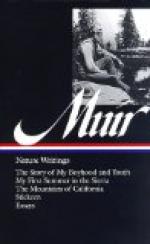Sometimes a flock of swans were seen passing over at a great height on their long journeys, and we admired their clear bugle notes, but they seldom visited any of the lakes in our neighborhood, so seldom that when they did it was talked of for years. One was shot by a blacksmith on a millpond with a long-range Sharp’s rifle, and many of the neighbors went far to see it.
The common gray goose, Canada honker, flying in regular harrow-shaped flocks, was one of the wildest and wariest of all the large birds that enlivened the spring and autumn. They seldom ventured to alight in our small lake, fearing, I suppose, that hunters might be concealed in the rushes, but on account of their fondness for the young leaves of winter wheat when they were a few inches high, they often alighted on our fields when passing on their way south, and occasionally even in our corn-fields when a snowstorm was blowing and they were hungry and wing-weary, with nearly an inch of snow on their backs. In such times of distress we used to pity them, even while trying to get a shot at them. They were exceedingly cautious and circumspect; usually flew several times round the adjacent thickets and fences to make sure that no enemy was near before settling down, and one always stood on guard, relieved from time to time, while the flock was feeding. Therefore there was no chance to creep up on them unobserved; you had to be well hidden before the flock arrived. It was the ambition of boys to be able to shoot these wary birds. I never got but two, both of them at one so-called lucky shot. When I ran to pick them up, one of them flew away, but as the poor fellow was sorely wounded he didn’t fly far. When I caught him after a short chase, he uttered a piercing cry of terror and despair, which the leader of the flock heard at a distance of about a hundred rods. They had flown off in frightened disorder, of course, but had got into the regular harrow-shape order when the leader heard the cry, and I shall never forget how bravely he left his place at the head of the flock and hurried back screaming and struck at me in trying to save his companion. I dodged down and held my hands over my head, and thus escaped a blow of his elbows. Fortunately I had left my gun at the fence, and the life of this noble bird was spared after he had risked it in trying to save his wounded friend or neighbor or family relation. For so shy a bird boldly to attack a hunter showed wonderful sympathy and courage. This is one of my strangest hunting experiences. Never before had I regarded wild geese as dangerous, or capable of such noble self-sacrificing devotion.




